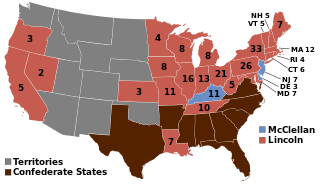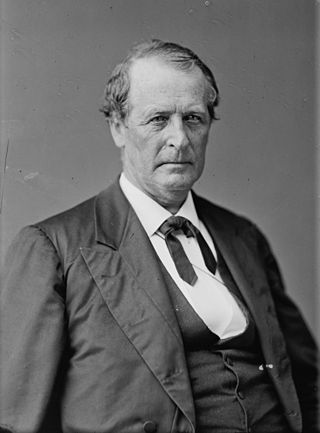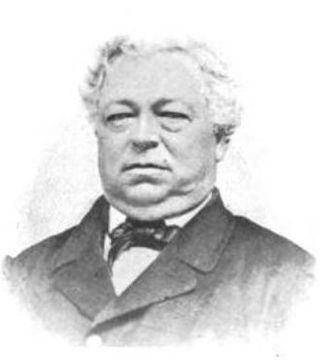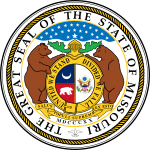
Presidential elections were held in the United States on November 8, 1864, near the end of the American Civil War. Incumbent President Abraham Lincoln of the National Union Party easily defeated the Democratic nominee, former General George B. McClellan, by a wide margin of 212–21 in the electoral college, with 55% of the popular vote. For the election, the Republican Party and some Democrats created the National Union Party, especially to attract War Democrats.

Thomas Samuel Ashe was an American lawyer and politician who served in the Confederate Congress, and U.S. Congressman from North Carolina.

Horatio Seymour was an American politician. He served as Governor of New York from 1853 to 1854 and from 1863 to 1864. He was the Democratic Party nominee for president in the 1868 United States presidential election, losing to Republican Ulysses S. Grant.

The 1856 Republican National Convention was a presidential nominating convention that met from June 17 to June 19, 1856, at Musical Fund Hall at 808 Locust Street in Philadelphia, Pennsylvania. It was the first national nominating convention of the Republican Party, founded two years earlier in 1854. It was held to nominate the party's candidates for president and vice president in the 1856 election. The convention selected John C. Frémont, a former United States Senator from California, for president, and former Senator William L. Dayton of New Jersey for vice president. The convention also appointed members of the newly established Republican National Committee.

James Madison Wells was elected Lieutenant Governor and became the 20th Governor of Louisiana during Reconstruction.

The 1998 Maine gubernatorial election took place on November 3, 1998 to elect the governor of Maine. Incumbent Independent governor Angus King won re-election to a second term, defeating Republican nominee James B. Longley Jr., Democratic nominee Thomas J. Connolly, Green Independent nominee Pat LaMarche and Taxpayers' Party nominee William P. Clarke Jr.

The 1860 Missouri gubernatorial election was held on August 6, 1860, and resulted in a victory for the Democratic nominee, Claiborne Fox Jackson. Jackson defeated the nominee of the Constitutional Union Party, Sample Orr, and Southern "Brekenridge" Democrat Former Gov. Hancock Lee Jackson to become the fifteenth governor of Missouri. Republican James B. Gardenhire also ran in the election, but received a negligible number of votes, despite Abraham Lincoln, a Republican, receiving 10% of the statewide vote in the presidential race.

The 1864 United States elections were held on November 8, 1864. National Union President Abraham Lincoln was elected to a second term, while the Republicans added to their majorities in Congress. The elections were held during the American Civil War. Lincoln would be assassinated shortly into his second term.

The 1872 United States presidential election in Texas was held on November 5, 1872, as part of the 1872 United States presidential election. State voters chose eight electors to represent the state in the Electoral College, which chose the president and vice president.

The 1877 New Jersey gubernatorial election was held on November 6, 1877. Democratic nominee George B. McClellan, who was the national Democratic Nominee in 1864, defeated Republican nominee William A. Newell with 51.65% of the vote.

The 1864 United States presidential election in Kansas took place on November 8, 1864, as part of the 1864 United States presidential election. Kansas voters chose three representatives, or electors, to the Electoral College, who voted for president and vice president.

The 1896 United States presidential election in Iowa took place on November 3, 1896. All contemporary 45 states were part of the 1896 United States presidential election. Voters chose 13 electors to the Electoral College, which selected the president and vice president.

The 1864 United States presidential election in Minnesota took place on November 8, 1864, as part of the 1864 United States presidential election. State voters chose four representatives, or electors, to the Electoral College, who voted for president and vice president.

In the 1864 U.S. presidential election, the Democrats nominated Union Army General George McClellan for U.S. President and Ohio U.S. Representative George Pendleton for U.S. Vice President. During the campaign, McClellan vowed to do a better job of prosecuting the Union Army effort in the American Civil War than incumbent U.S. President Abraham Lincoln did. Ultimately, the McClellan-Pendleton ticket lost to the National Union ticket of Abraham Lincoln and former U.S. Senator Andrew Johnson.
The 1864 Boston mayoral election was held on December 12, 1864 and saw Frederic W. Lincoln Jr. reelected to a sixth overall term.

The 1869 Ohio gubernatorial election was held on October 12, 1869. Incumbent Republican Rutherford B. Hayes defeated Democratic nominee George H. Pendleton with 50.74% of the vote.

The 1864 Indiana gubernatorial election was held on October 11, 1864. Incumbent Republican Oliver P. Morton, running on the Union Party ticket, defeated Democratic nominee Joseph E. McDonald with 53.72% of the vote.

The 1864 Vermont gubernatorial election for governor of Vermont took place on September 6. Incumbent J. Gregory Smith was a candidate for reelection to a second one-year term, in keeping with the provisions of the Republican Party's "Mountain Rule". The Democratic nominee was Timothy P. Redfield, a former member of the Vermont Senate, the Free Soil Party's 1851 nominee for governor, and the Democratic nominee in 1863. In the general election, the Republican Party's dominance of Vermont politics continued, and Smith was easily reelected.

The 1863 Vermont gubernatorial election for governor of Vermont took place on September 1. In accordance with the Republican Party's "Mountain Rule", incumbent Frederick Holbrook was not a candidate for reelection. The Republican nominee was J. Gregory Smith, the Speaker of the Vermont House of Representatives. The Democratic nominee was Timothy P. Redfield, a former member of the Vermont Senate and the Free Soil Party's nominee for governor in 1851. In the general election, the Republican Party's dominance of Vermont politics and government continued, and Smith was easily elected to a one-year term.

The 1864 New Hampshire gubernatorial election was held on March 8, 1864.




















